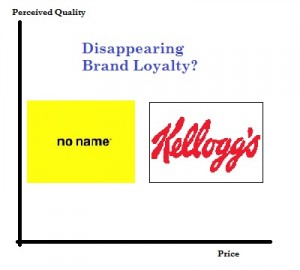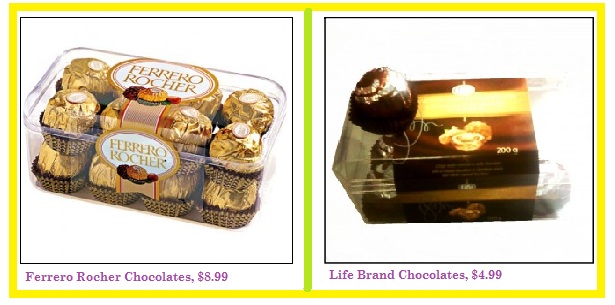 A few days ago, I purchased a box of Ferrero Rocher chocolates at Shoppers Drug Mart for $8.99 – a little exorbitant for a little box of chocolates. But I’ve seen their glamorous TV ads and had consumed it with satisfaction previously, so I was assured that I’d bought a good product at a reasonable price.
A few days ago, I purchased a box of Ferrero Rocher chocolates at Shoppers Drug Mart for $8.99 – a little exorbitant for a little box of chocolates. But I’ve seen their glamorous TV ads and had consumed it with satisfaction previously, so I was assured that I’d bought a good product at a reasonable price.
However – a few days later, I spotted the same type of chocolates from the store’s in-house LIFE Brand, retailing for $4.99. As you can see below – the packaging and style are almost identical, and there was no difference in taste. And I thought – why would I buy Ferrero Rocher chocolates to eat if I can get an identical product at around half its price? For gift-giving, Ferrero Rocher may be more appropriate, but the Life Brand ones will be my chocolate of choice for my own consumption.
Brandchannel.com’s post, Tracking the Generational Shift in Brand Loyalty
discusses this trend of wavering brand loyalty among consumers and raises some interesting questions. Marketers have always emphasized the importance of creating brand loyalty and even taking it one step further by creating incentive programs for loyalty. However, this long-held concept is about to face a reality check as a recent AMP Agency study showed that “a meager 3% of consumers surveyed in this age group [of 25 – 49] said they’re loyal to a particular brand”. The reason? Consumers are spending time and effort into researching products online before purchasing – 94% of those surveyed agreed that their purchases were positively influenced by research. The study notes that certain product categories such as electronics are subject to prior online research (64% of consumers) than others, like food or fashion (25% of consumers).
What does this new direction in consumer behavior mean for consumer product corporations around the world? It means that for these companies– this new behavior of “contemporary loyalty” means that they can no longer solely rely on advertising to boost sales. Consumers have “seized control and are more open to the wide choices in the marketplace”. The advertising claims must be backed up by solid, good quality, and reasonably-priced products, which in turn results in positive reception from consumers and product reviewers alike. This trend is especially acute during recessions, as research shows that 65% of US consumers have bought more generic brands to save money.
Many are willing to pay premium prices of over $100 for a Lululemon hoodie, and over $1000 for a Mac. Do they buy it merely because of strong brand loyalty (and effective branding), or perceived quality and reviews? And what about your purchases of things like dish detergent? Soft drinks? Backpacks? To what extent are you brand-loyal, for which products, and why?
Categories:

